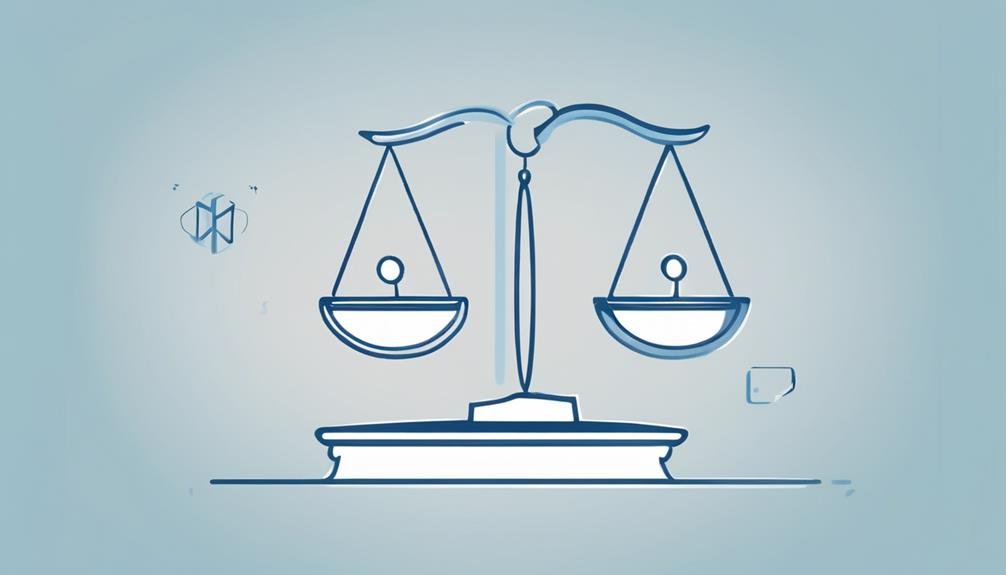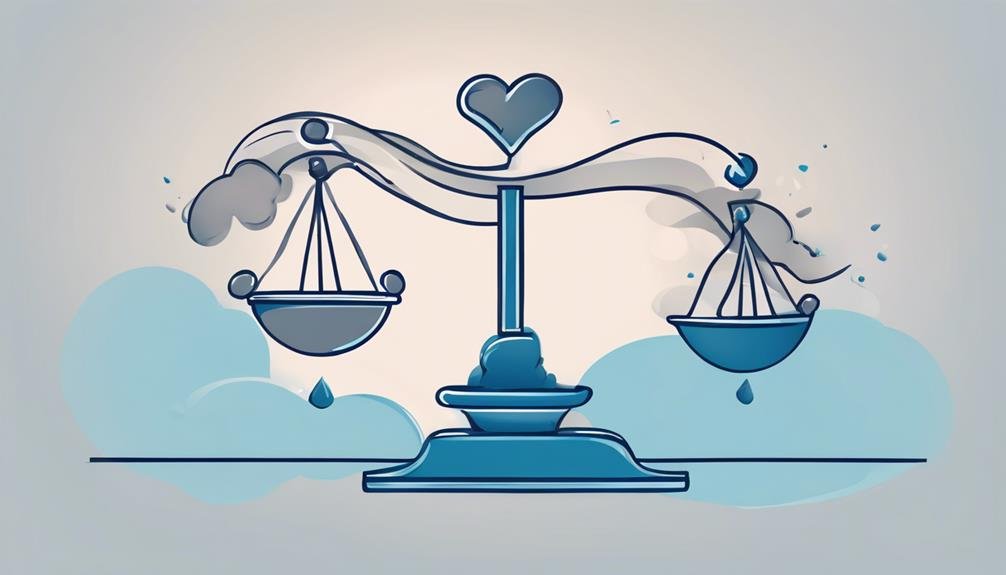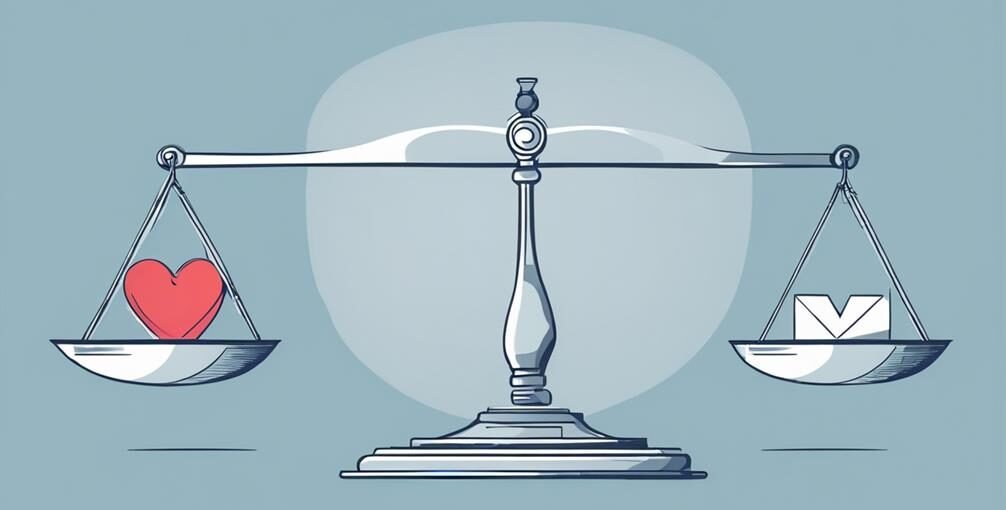How to Weigh HRT Benefits and Risks for Men
When weighing HRT benefits and risks, focus on your symptoms and lifestyle. Evaluate how low testosterone affects your energy, mood, and libido. HRT can boost your energy and improve your overall quality of life, but it comes with potential risks like cardiovascular issues and mood changes. Consult with your healthcare provider to discuss your medical history, possible side effects, and monitoring procedures. Keep a journal of your symptoms to aid your discussions. By understanding your individual health needs and choices, you can make an informed decision that works best for you. There's much more to explore on this topic.
Key Takeaways
- Consult with healthcare providers to assess hormone levels and underlying medical conditions before considering HRT.
- Weigh the benefits of improved energy, mood, and libido against potential risks like cardiovascular issues and hormonal imbalances.
- Keep a journal to track symptoms related to mood, energy, and libido for better communication with healthcare professionals.
- Consider lifestyle factors, such as diet, exercise, and sleep, to enhance HRT effectiveness and minimize risks.
Understanding Hormone Replacement Therapy
Hormone replacement therapy (HRT) offers men a way to address hormonal imbalances that can impact their health and well-being.
It involves supplementing testosterone levels, which may decline due to aging, stress, or health conditions. You might experience symptoms like fatigue, reduced libido, or mood swings, signaling that your hormone levels need attention.
HRT can come in various forms, including injections, gels, or patches, allowing you to choose what fits your lifestyle best.
Before starting, it's important to consult with a healthcare provider who can assess your hormone levels and overall health. Understanding the potential changes and risks associated with HRT is vital.
Knowing how it works can empower you to make informed decisions about your treatment options.
Benefits of HRT for Men

Many men find that HRT can greatly enhance their energy levels, mood, and overall quality of life.
When testosterone levels drop, you might experience fatigue, irritability, or even depression. HRT can help restore hormonal balance, leading to improved emotional stability and increased motivation.
Furthermore, many men notice enhanced physical performance, including increased muscle mass and strength, which can boost confidence and self-esteem. HRT may also improve libido, making intimate relationships more satisfying.
In addition, some men report better cognitive function and memory, helping you stay sharp and focused.
Potential Risks of HRT
While HRT can offer significant benefits, it is crucial to be aware of its potential risks, which may include cardiovascular issues, sleep apnea, and changes in mood or behavior. Understanding these risks can help you make informed decisions about your treatment.
| Risk Type | Description | Management Strategies |
|---|---|---|
| Cardiovascular Issues | Increased risk of heart disease | Regular check-ups, lifestyle changes |
| Sleep Apnea | Breathing interruptions during sleep | CPAP therapy, weight management |
| Mood Changes | Anxiety or depression | Therapy, medication adjustments |
| Skin Reactions | Rashes or irritation | Consult a dermatologist |
| Hormonal Imbalance | Fatigue or weight gain | Monitor hormone levels |
Being proactive about these potential risks will help you navigate your HRT journey more safely.
Testosterone and Aging

As you age, your testosterone levels naturally decline, which can affect your energy, mood, and overall health. You might notice changes that can impact your daily life. Understanding these effects is vital.
Here are three key areas to reflect on:
- Energy Levels: Reduced testosterone can lead to fatigue, making daily activities feel more challenging.
- Mood Swings: Lower testosterone may contribute to feelings of sadness or irritability, impacting your emotional well-being.
- Libido Changes: A decline in testosterone often affects your sex drive, which can influence personal relationships.
Recognizing these changes can help you address them proactively. It's important to discuss any concerns with your healthcare provider to explore potential options and find the best approach for your health.
Effects on Physical Health
Low testosterone levels can also lead to various physical health issues that impact your overall well-being.
You might experience fatigue, diminished muscle mass, and increased body fat, which can affect your strength and stamina. Additionally, low testosterone can contribute to decreased bone density, raising your risk of fractures and osteoporosis.
Cardiovascular health can also suffer, as low testosterone has been linked to higher levels of fat in the blood and increased blood pressure.
By considering HRT, you may improve these physical aspects, enhancing your overall health and liveliness.
However, it's essential to weigh these benefits against potential risks, such as prostate health concerns or cardiovascular effects.
Always consult your healthcare provider to make an informed decision that suits your unique situation.
Mental Health Considerations

Considering hormone replacement therapy (HRT) can greatly impact your mental health, potentially alleviating symptoms of depression, anxiety, and mood swings associated with low testosterone levels. Before making a decision, think about these important factors:
- Emotional Stability: Many men report improved mood and emotional resilience after starting HRT.
- Cognitive Function: Some studies suggest that balanced hormone levels may enhance focus and memory.
- Social Interactions: Improved mental health can lead to better relationships and increased social engagement.
It's essential to have open discussions with your healthcare provider about how HRT might affect your mental well-being.
Regular monitoring and adjustments can help you achieve the best outcomes, balancing both mental and physical health benefits.
Evaluating Your Symptoms

Identifying and evaluating your symptoms is essential in determining whether hormone replacement therapy (HRT) is the right choice for you.
Start by keeping a journal of your experiences, noting any changes in mood, energy levels, libido, and physical health. Reflect on how long you've been experiencing these symptoms and their intensity. This self-assessment helps you articulate your concerns to your healthcare provider.
Be honest about how these symptoms affect your daily life, relationships, and overall well-being. Discuss any previous treatments and their outcomes, as this information can guide your doctor in recommending the best approach.
Ultimately, understanding your symptoms will empower you in the decision-making process regarding HRT and its potential benefits or risks.
Lifestyle Factors and HRT

Your lifestyle choices can greatly influence the effectiveness and safety of hormone replacement therapy (HRT) for men. By making mindful decisions, you can enhance your results and minimize potential risks.
Here are three key factors to take into account:
- Diet: Eating a balanced diet rich in nutrients can help your body respond better to HRT. Focus on whole foods, lean proteins, and healthy fats.
- Exercise: Regular physical activity boosts testosterone levels naturally and improves overall health. Aim for a mix of cardio and strength training.
- Sleep: Prioritizing quality sleep is essential. Poor sleep can disrupt hormone levels and hinder HRT effectiveness.
Consultation With Healthcare Professionals

Consulting with healthcare professionals is essential for effectively weighing the benefits and risks of hormone replacement therapy (HRT) for men.
You should seek out a qualified physician who specializes in hormonal health to discuss your unique situation. They'll assess your medical history, current health status, and specific symptoms, helping you understand how HRT could impact you.
Don't hesitate to ask questions about the potential side effects, treatment methods, and monitoring processes involved in HRT. This dialogue will empower you to make informed choices.
Additionally, consider getting a second opinion if you're unsure about the recommendations. Remember, your healthcare provider is there to support you, so keep an open line of communication for the best outcomes in your HRT journey.
Making an Informed Decision

Weighing the pros and cons of hormone replacement therapy (HRT) requires careful consideration of both your health goals and potential risks. To make an informed decision, think about these key factors:
- Personal Health Needs: Assess your current health, lifestyle, and any underlying conditions that might influence your HRT suitability.
- Potential Benefits: Consider how HRT might improve your quality of life, including energy levels, mood, and overall well-being.
- Risks and Side Effects: Research possible side effects and long-term implications associated with HRT, such as cardiovascular health or mood changes.
Ultimately, making an informed choice involves weighing these elements against your individual circumstances and discussing them with your healthcare provider.
This way, you can arrive at the best decision for your unique situation.
Questions
Can HRT Affect My Libido Differently Than Testosterone Alone?
Yes, HRT can affect your libido differently than testosterone alone. The combination of hormones might enhance or reduce sexual desire based on individual body chemistry, so it's crucial to monitor how you feel during treatment.
Are There Specific Age Restrictions for Starting Hrt?
Imagine standing at the crossroads of your health. There aren't strict age restrictions for starting HRT, but your doctor'll guide you based on individual needs, health conditions, and potential benefits tailored just for you.
How Long Does It Take to See HRT Effects?
You'll typically start noticing HRT effects within a few weeks to several months, depending on the treatment type. Patience is key, as changes can vary considerably among individuals, and consistent follow-up is essential.
Can Lifestyle Changes Enhance HRT Effectiveness?
Yes, lifestyle changes can enhance HRT effectiveness. By incorporating regular exercise, a balanced diet, and stress management techniques, you'll support your body's response to treatment and potentially improve overall health outcomes during your hormone therapy journey.
What Alternative Therapies Exist Besides HRT for Hormonal Issues?
Consider complementary choices like counseling, dietary adjustments, or herbal remedies. These alternative therapies can help harmonize hormones, enhance health, and improve overall well-being. Explore options that suit your lifestyle and preferences for best results.
Conclusion
As you weigh the benefits and risks of hormone replacement therapy, remember that it's not just about numbers on a chart; it's about your quality of life.
Coincidentally, the choices you make today can shape your future health and happiness.
By understanding your symptoms, considering lifestyle factors, and consulting with healthcare professionals, you're not just making a decision—you're crafting a path toward a more vibrant you.
Trust yourself to find the right balance for your journey.

